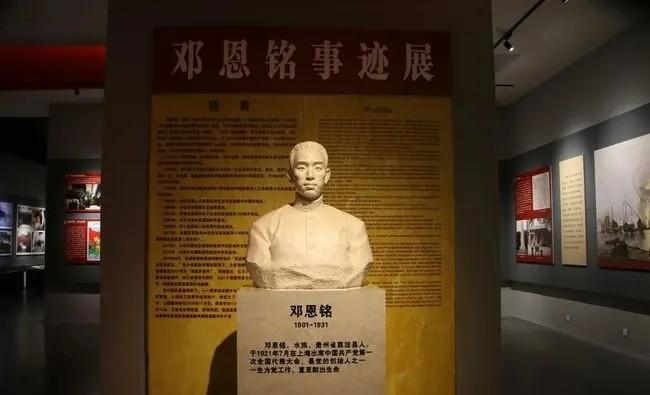When New China was founded, Chairman Mao once told the responsible comrades of Shandong Province: "The revolution has triumphed, and we must not forget the old comrades." You in Shandong should clarify the situation of Comrades Wang Gemei and Deng Enming, and you should collect cultural relics of martyrs. ”
Who is Deng Enming, who made Chairman Mao remember? Probably many people are not very familiar with this name. In fact, he was a deputy to the First and Second Congresses of the Communist Party of China, a proletarian revolutionary, one of the founders of the Communist Party of China, and an early organizer and leader of the Shandong Party organization. On September 10, 2009, Deng Enming was also named one of the 100 heroic and exemplary figures who made outstanding contributions to the founding of New China.

In 1901, Deng Enming was born in Shuipu Village, Yuping Town, Libo County, Guizhou Province, and in order to seek the truth of saving the country, the sixteen-year-old Deng Enming went north to study. During his studies at Shandong Provincial No. 1 Middle School, Deng Enming was influenced and inspired by progressive books and periodicals such as New Youth. After the outbreak of the May Fourth Movement, Deng Enming was elected as the leader of the Student Self-Government Association and the head of the Publication Department, edited the school newspaper, and organized students to participate in the strike movement.
During this period, Deng Enming and Wang Gemei, the student leader of the Jinan Provincial First Normal School, saw each other as before and became revolutionary comrades-in-arms. After the baptism of the May Fourth Movement, Deng Enming and a group of other progressive young people gradually accepted Marxism and devoted themselves to the spread of Marxism. In order to expand the progressive front, Deng Enming and Wang Gemei initiated the establishment of the "Lixin Society" in Jinan, and founded the "Lixin" publication to introduce the October Revolution in Russia and criticize the current social situation.
In the spring of 1921, the early organization of the Jinan Communist Party was established, and Deng Enming was one of the leaders of the group. In July of the same year, Deng Enming and Wang Gemei, as representatives of the CPC organization in Jinan, went to Shanghai to attend the First National Congress of the Communist Party of China and participated in the founding of the Communist Party of China. Deng Enming, who was only twenty years old, returned to Jinan to establish the Shandong branch of the CPC and embarked on the road of revolution. As the pioneer of the Qingdao revolution, he was alone for a long time, Deng Enming said in a letter to his friend Liu Renjing: "It is like a poor and lonely army struggling. ”
Under the active planning of Deng Enming, in February 1925, the workers of Jiaoji Railway and Sifang Locomotive Factory held a factory-wide strike. Deng Enming and Wang Gemei also organized and led the general strike of the Workers' League of the Japanese Merchants Spinning Mill in Qingdao, forming the first strike climax in Qingdao's history, which lasted more than three months and became the precursor of the May Thirtieth Movement.
In November 1925, because the organs of the Shandong local committee were destroyed by the enemy, Deng Enming was arrested and imprisoned and brutally tortured. Later, because he contracted tuberculosis in prison, he was rescued by the party organization and was released on medical parole. During this period, Deng Enming's parents and other relatives dissuaded him in the name of dingqin, and he replied in his family letter that "the son's proposition is established and will never be changed", and the revolutionary will has never wavered. After the defeat of the Great Revolution, Deng Enming traveled all over Shandong and continued to lead the party organizations to carry out struggles.
On January 19, 1929, Deng Enming returned to Jinan from the Zibo mining area, and due to the rebellion of Wang Fuyuan and Wang Yongzhang, Deng Enming was arrested and imprisoned again in Jinan. In the face of torture, Deng Enming gritted his teeth and did not waver, and in prison he also led two hunger strikes and organized two escape struggles, so that seven comrades escaped from danger one after another, while he himself was put on death row because he was ill and weak, failed to escape, and was put on death row.
In March 1931, Deng Enming wrote the last family letter and left a farewell poem: "In the blink of an eye for thirty years, the ambition is not rewarded, and I will not hesitate to die first, and then frequently comfort the Nine Springs", expressing the feelings of home and country who sacrificed their lives for righteousness and regarded death as a homecoming, and their firm confidence in those who succeeded the revolution. Subsequently, Deng Enming and twenty-two other Communists were killed by the reactionary warlord Han Fuyu at the Weiba Road Execution Ground in Jinan, and Deng Enming was shackled and sang the "Internationale" calmly and righteously, at the age of thirty.
From Guizhou to Shandong, the revolutionary fire planted by Deng Enming is still alive and well a hundred years later. His strong courage is like a beacon, inspiring future generations to fight for the revolutionary cause. Only when we grew up in the era of peace can we relive history and remember heroes in order to understand the hard-won happiness of today's life.